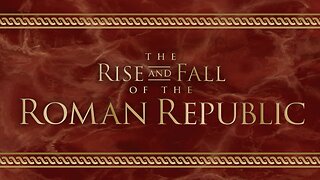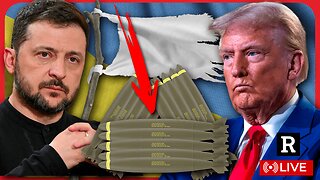Premium Only Content

Machiavelli in Context | The Prince, 6–7: Virtù and Fortuna (Lecture 7)
Lecture 7: We first look at two terms that Machiavelli uses often, virtù (“virtue”) and Fortuna (“fortune”) and what they mean when he uses them. We then approach chapter 6, which concerns new principalities conquered through the prince’s own skill.
In it, Machiavelli will cite such diverse figures as Moses; Romulus, the legendary founder of Rome; Theseus, the legendary Athenian; and even Girolamo Savonarola, the Dominican friar who dominated Florentine politics immediately following the expulsion of the Medici in 1494.
Chapter 7, which deals with territories acquired by fortune or by the arms of others, is one of the most famous in The Prince. Here, Machiavelli introduces his readers to Cesare Borgia, often referred to as Machiavelli’s hero or role model for a modern prince. Machiavelli, while an ambassador for the Florentine Republic, had met Borgia, and certainly he admired many of Borgia’s “Machiavellian” traits.
Recommended Readings:
Machiavelli, The Prince, translated by Peter Bondanella, chapters 6–7.
-
 20:08
20:08
The Great Courses
1 month agoThe Rise And Fall Of The Roman Republic | The Ancient World Before Rome (Lecture 2)
290 -
 1:45:39
1:45:39
Kim Iversen
14 hours agoTrump Attacks Thomas Massie—But MAGA Isn’t Having It! Is Trump Picking the Wrong Fight?
98.4K164 -
 56:31
56:31
Glenn Greenwald
13 hours agoUNLOCKED EPISODE: On Europe’s Emergency Defense Summit, the Future of Independent Media, Speech Crackdowns and More
139K59 -
 43:48
43:48
BonginoReport
15 hours agoMainstream Media Plots The Next Plandemic! (Ep.02) - 03/11/2025
187K337 -
 1:13:13
1:13:13
Michael Franzese
15 hours agoMegyn Kelly’s UNFILTERED Take on The Ukraine War, Trump & Modern Masculinity
135K57 -
 1:43:21
1:43:21
Redacted News
16 hours agoBREAKING! UKRAINE AGREES TO CEASEFIRE WITH RUSSIA... BUT THERE'S A BIG CATCH | Redacted News
232K374 -
 58:17
58:17
Candace Show Podcast
17 hours agoShould We Feel Bad For Blake Lively? | Candace Ep 157
190K389 -
 3:06:52
3:06:52
The Nerd Realm
17 hours ago $14.72 earnedHollow Knight Voidheart Edition #19 | Nerd Realm Playthrough
112K6 -
 1:17:27
1:17:27
Awaken With JP
20 hours agoThe Current Thing: Tesla Protesting - LIES Ep 82
178K84 -
 1:07:08
1:07:08
Sean Unpaved
17 hours agoNFL Free Agency Rolls On! MLB Spring Training Heats Up along with 3x World Series Champ Dave Stewart
108K4